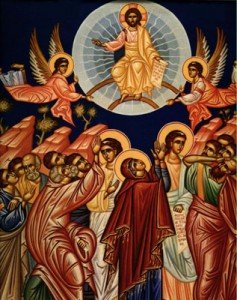 Sources of the first three centuries do not speak of the feast of the Ascension. Experts in Liturgy are of the opinion that in the first three centuries the celebration of this feast was combined with the feast of Pentecost. It was not until the fourth century that Ascension became an universal feast.
Sources of the first three centuries do not speak of the feast of the Ascension. Experts in Liturgy are of the opinion that in the first three centuries the celebration of this feast was combined with the feast of Pentecost. It was not until the fourth century that Ascension became an universal feast.
In the Eastern Church, the Ascension is interpreted as the real culmination of the mystery of the Incarnation, in that it not only marked the completion of Jesus’ physical presence among his apostles, but consummated the union of God and man when Jesus ascended in his glorified human body to sit at the right hand of God the Father. The Ascension and the Transfiguration both figure prominently in the Eastern Church’s doctrine of Theosis. Christ’s bodily Ascension into heaven is also understood as the final token of His two natures: divine and human.
The narrative of the Ascension is peculiar to Luke and Acts, although other parts of the New Testament may refer to it. Ephesians 4:8–10 may be such a reference, but many interpreters hold that for Paul Resurrection was identical with Ascension. That, they maintain, is why he could speak of the appearance of the risen Christ to him in continuity with the appearances to others (I Corinthians 15:5–8) despite the fact that, in the chronology of the creed, the Ascension intervened between them.
The primitive kerygma recorded in 1 Corinthians, mentions no final leave-taking of the risen Jesus. The early Jerusalem preaching refers to Jesus’ departure only in as far as it is theologically significant and never turns to the material details of when, where, and how that are the indispensable data for the historian. In early preaching, for which the continual presence of the risen Jesus with believers was the all-important datum, may well have considered such details irrelevant. The departure of Jesus did not alter essentially the relation of the believer to his Lord. He had been seen, and He would be seen again – soon they hoped; meanwhile, His invisible presence perdured.
As years lengthened into decades and fervent hope for the Second Coming was tempered by the full realization that no one knew the exact time of the future return, the second generation of Christians desired to know further details about the final visible departure of Jesus. Luke responded by gleaning from the first-generation preaching and its documentary precipitate such details as he could concerning the when, where, and how of Jesus’ departure. Luke, who is also thought to be the author of ACTS, presents two different versions of the final departure. It really doesn’t matter. Christ IS with us!

